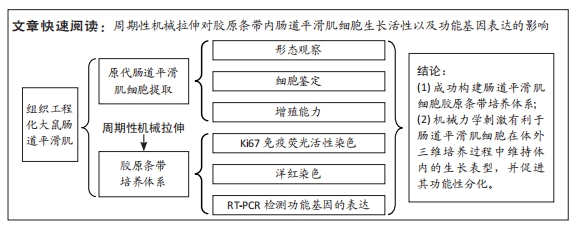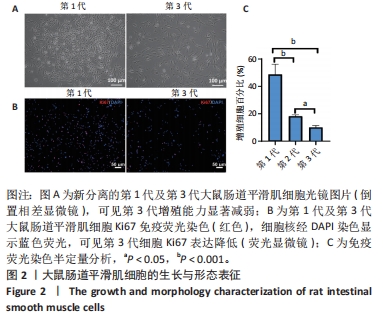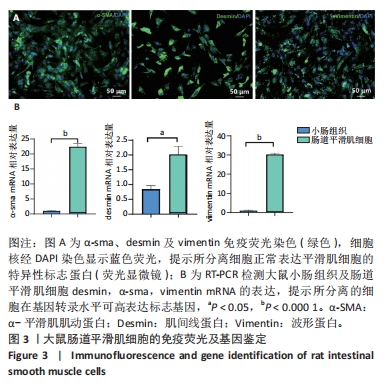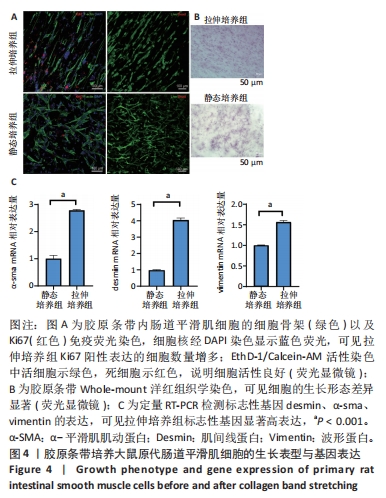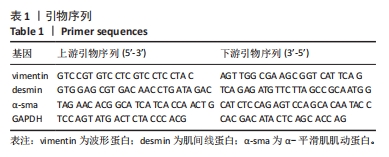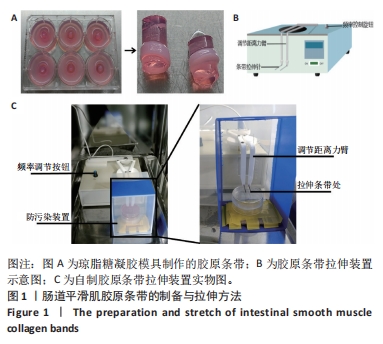[1] TULLIE L, JONES BC, DE COPPI P, et al. Building gut from scratch - progress and update of intestinal tissue engineering. Nat Rev Gastroenterol Hepatol. 2022;19(7):417-431.
[2] BINES JE. Intestinal failure: A new era in clinical management. J Gastroenterol Hepatol. 2009;24 Suppl 3:S86-92.
[3] WALES PW, DE SILVA N, KIM J, et al. Neonatal short bowel syndrome: population-based estimates of incidence and mortality rates. J Pediatr Surg. 2004;39(5):690-695.
[4] SPENCER AU, NEAGA A, WEST B, et al. Pediatric short bowel syndrome: redefining predictors of success. Ann Surg. 2005;242(3):403-409.
[5] BITAR KN, ZAKHEM E. Bioengineering the gut: future prospects of regenerative medicine. Nat Rev Gastroenterol Hepatol. 2016;13(9): 543-556.
[6] ZAKHEM E, RAGHAVAN S, SUHAR RA, et al. Bioengineering and regeneration of gastrointestinal tissue: where are we now and what comes next? Expert Opin Biol Ther. 2019;19(6):527-537.
[7] COSTA J, AHLUWALIA A. Advances and Current Challenges in Intestinal in vitro Model Engineering: A Digest. Front Bioeng Biotechnol. 2019; 7:144.
[8] LI N, WANG D, SUI Z, et al. Development of an improved three-dimensional in vitro intestinal mucosa model for drug absorption evaluation. Tissue Eng Part C Methods. 2013;19(9):708-719.
[9] POIRIER AA, AUBÉ B, CÔTÉ M, et al. Gastrointestinal Dysfunctions in Parkinson’s Disease: Symptoms and Treatments. Parkinsons Dis. 2016; 2016:6762528.
[10] CARROLL RE, BENEDETTI E, SCHOWALTER JP, et al. Management and Complications of Short Bowel Syndrome: an Updated Review. Curr Gastroenterol Rep. 2016;18(7):40.
[11] BEIN A, SHIN W, JALILI-FIROOZINEZHAD S, et al. Microfluidic Organ-on-a-Chip Models of Human Intestine. Cell Mol Gastroenterol Hepatol. 2018;5(4):659-668.
[12] COLLIER CA, MENDIONDO C, RAGHAVAN S. Tissue engineering of the gastrointestinal tract: the historic path to translation. J Biol Eng. 2022;16(1):9.
[13] MOYSIDOU CM, BARBERIO C, OWENS RM. Advances in Engineering Human Tissue Models. Front Bioeng Biotechnol. 2021;8:620962.
[14] DUNN JCY. Intestinal Bioengineering. Clin Transpl. 2016;32:1-4.
[15] GRIKSCHEIT TC, SIDDIQUE A, OCHOA ER, et al. Tissue-engineered small intestine improves recovery after massive small bowel resection. Ann Surg. 2004;240(5):748-754.
[16] LAMBONI L, XU C, CLASOHM J, et al. Silk sericin-enhanced microstructured bacterial cellulose as tissue engineering scaffold towards prospective gut repair. Mater Sci Eng C Mater Biol Appl. 2019; 102:502-510.
[17] HU Y, QIN Z, YOU R, et al. The Relationship between Secondary Structure and Biodegradation Behavior of Silk Fibroin Scaffolds. Adv Mater Sci Eng. 2012;2012:185905-185909.
[18] SZCZEPANSKI HE, FLANNIGAN KL, MAINOLI B, et al. NR4A1 modulates intestinal smooth muscle cell phenotype and dampens inflammation-associated intestinal remodeling. FASEB J. 2022;36(11):e22609.
[19] LIU J, ZHANG P, ZHENG Z, et al. GABAergic signaling between enteric neurons and intestinal smooth muscle promotes innate immunity and gut defense in Caenorhabditis elegans. Immunity. 2023;56(7):1515-1532.e9.
[20] CHEVALIER NR, AGBESI RJA, AMMOUCHE Y, et al. How Smooth Muscle Contractions Shape the Developing Enteric Nervous System. Front Cell Dev Biol. 2021;9:678975.
[21] HAN TY, LOURENSSEN S, MILLER KG, et al. Intestinal smooth muscle phenotype determines enteric neuronal survival via GDNF expression. Neuroscience. 2015;290:357-368.
[22] CHEN H, LI X, GAO L, et al. Construction and identification of an immortalized rat intestinal smooth muscle cell line. Neurogastroenterol Motil. 2022;34(8):e14359.
[23] PATIL PB, CHOUGULE PB, KUMAR VK, et al. Recellularization of acellular human small intestine using bone marrow stem cells. Stem Cells Transl Med. 2013;2(4):307-315.
[24] FINKBEINER SR, FREEMAN JJ, WIECK MM, et al. Generation of tissue-engineered small intestine using embryonic stem cell-derived human intestinal organoids. Biol Open. 2015;4(11):1462-1472.
[25] DEW L, ENGLISH WR, CHONG CK, et al. Investigating Neovascularization in Rat Decellularized Intestine: An In Vitro Platform for Studying Angiogenesis. Tissue Eng Part A. 2016;22(23-24):1317-1326.
[26] HORI Y, NAKAMURA T, MATSUMOTO K, et al. Tissue engineering of the small intestine by acellular collagen sponge scaffold grafting. Int J Artif Organs. 2001;24(1):50-54.
[27] NAKASE Y, HAGIWARA A, NAKAMURA T, et al. Tissue engineering of small intestinal tissue using collagen sponge scaffolds seeded with smooth muscle cells. Tissue Eng. 2006;12(2):403-412.
[28] ZAKHEM E, RAGHAVAN S, GILMONT RR, et al. Chitosan-based scaffolds for the support of smooth muscle constructs in intestinal tissue engineering. Biomaterials. 2012;33(19):4810-4817.
[29] LIU Y, NELSON T, CROMEENS B, et al. HB-EGF embedded in PGA/PLLA scaffolds via subcritical CO2 augments the production of tissue engineered intestine. Biomaterials. 2016;103:150-159.
[30] KOBAYASHI M, KHALIL HA, LEI NY, et al. Bioengineering functional smooth muscle with spontaneous rhythmic contraction in vitro. Sci Rep. 2018;8(1):13544.
[31] DULING RR, DUPAIX RB, KATSUBE N, et al. Mechanical characterization of electrospun polycaprolactone (PCL): a potential scaffold for tissue engineering. J Biomech Eng. 2008;130(1):011006.
[32] HORI Y, NAKAMURA T, KIMURA D, et al. Experimental study on tissue engineering of the small intestine by mesenchymal stem cell seeding. J Surg Res. 2002;102(2):156-160.
[33] RAGHAVAN S, LAM MT, FOSTER LL, et al. Bioengineered three-dimensional physiological model of colonic longitudinal smooth muscle in vitro. Tissue Eng Part C Methods. 2010;16(5):999-1009.
[34] RAGHAVAN S, BITAR KN. The influence of extracellular matrix composition on the differentiation of neuronal subtypes in tissue engineered innervated intestinal smooth muscle sheets. Biomaterials. 2014;35(26):7429-7440.
[35] 吴数.体外构建各向异性的丝蛋白三维肠道模型的研究[D].苏州:苏州大学,2021.
[36] CHEN Y, GUO C, MANOUSIOUTHAKIS E, et al. Bi-layered Tubular Microfiber Scaffolds as Functional Templates for Engineering Human Intestinal Smooth Muscle Tissue. Adv Funct Mater. 2020;30(17): 2000543.
[37] CHEVALIER NR, DE WITTE TM, CORNELISSEN AJM, et al. Mechanical Tension Drives Elongational Growth of the Embryonic Gut. Sci Rep. 2018;8(1):5995.
[38] SPENCER NJ, COSTA M, HIBBERD TJ, et al. Advances in colonic motor complexes in mice. Am J Physiol Gastrointest Liver Physiol. 2021;320(1):G12-G29.
[39] ZHAO YS, WANG CY, LI DX, et al. Construction of a unidirectionally beating 3-dimensional cardiac muscle construct. J Heart Lung Transplant. 2005;24(8):1091-1097.
[40] KIM BS, MOONEY DJ. Scaffolds for engineering smooth muscle under cyclic mechanical strain conditions. J Biomech Eng. 2000;122(3):210-215.
|
